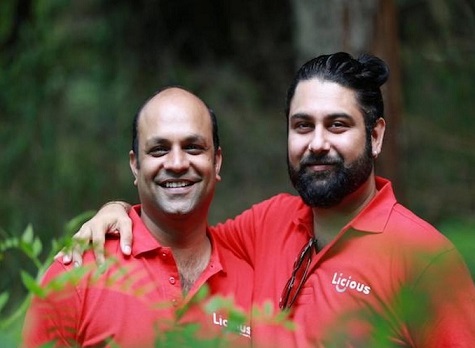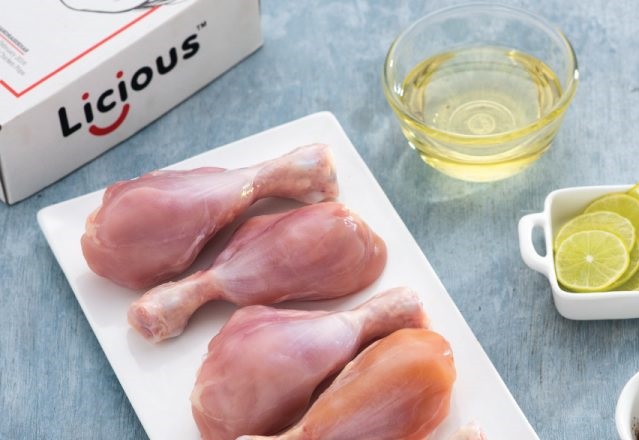
Licious has become the first direct-to-customer (D2C) company and the first meat delivery startup in India to join the Unicorn club.
It has raised $52 million in a funding round led by IIFL Asset Management’s (AMC’s) late-stage tech fund. The funding has taken its valuation to $1.05 billion, making it the 29th Indian startup unicorn of 2021 and the first homegrown D2C company to achieve the feat.
The funding will help it to compete better with players such as FreshToHome, Zappfresh, as well as large players, such as BigBasket and Swiggy.
An unlikely duo – Abhay Hanjura a Kashmiri Pandit, and Vivek Gupta hailing from a pure vegetarian family quit their jobs – Hanjura with Futurisk Insurance Broking Company and Gupta with venture capital firm Helion – to start the meat venture Licious.
Stories from NRI friends about turning vegetarian during their visits home, concerns about the availability of quality meat and seafood at par with global standards got them thinking and the journey began – to understand what was missing and how to tap this opportunity to fulfil the growing focus on quality.
Their preliminary research included a comprehensive in-depth study of industry statistics, consulting food industry experts, and visiting poultry, goat firms, and the coastline to understand how the supply chain worked. Study of evolved meat-eating markets like China, Japan, and Korea gave them the insight into setting up processing centres and building cold chains. They launched ‘Licious’ in 2015, with a simple thought that it would not sell what they would not eat themselves.
Licious through its e-commerce platform sells meat and seafood in over a dozen Indian cities. It has built a supply chain network across several Indian cities to procure meat and seafood, keep them fresh, and deliver within hours of the order.
The company is counted among the fastest-growing consumer brands in India. The brand’s greatest USP is its superior quality product, which has ensured a consistent repeat order rate of 90% since the brand’s first year of operations. It is the first Indian meat and seafood brand from India to get an FSSC22000 certification, one of the highest food safety certifications in the world.

Initial years saw the company outsourcing its customer care operations. A big business mistake as prompt and effective resolution of customer issues could not be achieved. So, the company decided to get all its employees on the payroll and train them extensively on meat and seafood. Now the company owns and controls the entire supply chain to ensure coherent product standards and uncompromised customer services. The company owns five processing units, one each in Mumbai, Delhi-NCR, and Hyderabad, and two in Bengaluru. The stress is on the ‘freshness’ factor, the ‘raw’ products are delivered within 24-48 hours. All its products are stored at 0-4⁰ temperature and do not contain antibiotics, chemicals, artificial preservatives, color, and flavoring.
India’s meat market is valued at $40 billion, with over 70% of the country’s population being meat-eaters. According to industry estimates, India’s online meat market is worth over $4.4 billion and has grown by over 2.5x since the pandemic hit last year.
The online meat players saw a 10-15% jump in average revenue per user and reported a 10-15% improvement in customer retention in 2020. It is estimated that India’s online meat market will be worth $80-85 billion by 2024.
Today, the company delivers more than 1 million orders per month and has a strong presence across 14 Indian markets, namely Bengaluru, Hyderabad, NCR, Chandigarh, Mumbai, Pune, Chennai, Jaipur, Coimbatore, Kochi, Puducherry, Vizag, Vijayawada and Kolkata. Entry into these strategic markets, including Tier II cities, highlight the brand’s commitment to elevate an industry that is still 96% unorganized.
Since its inception, Licious claims to have grown at a CAGR of 300% year on year and a 500% growth in the past 12 months and delivered to more than 2 million unique customers. Its overall revenue grew six times between May and December 2020, when doorstep delivery became the new normal due to coronavirus shutdowns.
In the first 6 months of FY2021, the company clocked a whopping revenue of Rs. 600 crore. As per the reports, meat and seafood sales in these 6 months were more than the total sale of both products in the last 5 years. Chicken has contributed maximum to the revenue of Licious.
Millennials and men – the new gastronauts are consistently present through all their communication. Licious has rolled out an exciting campaign titled #FasterChef featuring actor, director, and podcaster, Kunaal Roy Kapur. The new ad film is fun and engaging, and sure to entice the young & the young-at-heart alike.
Licious is not only growing in the meat business but it is breaking stereotypes. Their fight is against fear, hypocrisy, and stigma of society about meat.
Licious was also invited by Harvard Business School for a keynote speech. Licious is the first Indian brand to sign up to the ‘Commitment to Chicken Welfare’ in partnership with the World Animal Protection India organization. Building on their commitment to becoming compliant with the global ESG (Environmental, Social and Governance) norms, this pledge to better chicken welfare is another step towards ensuring high levels of animal welfare, quality, sustainability & traceability in their supply chain by the year 2030.
World Animal Protection recently launched a global assessment investigating the welfare of chickens raised for their meat to be supplied to the world’s biggest Quick Service Restaurant (QSR) chains and shockingly, most companies have shown no inclination to improve standards in Asian markets like India.
By 2030, all suppliers of Licious will have to meet the following requirements for 100% of the broiler chicken in their supply chain:
1. Maximum stocking density of 2.7kg / ft2 (30kg/ m2) and prohibit broiler cages.
2. Provide birds enriched environments, including
* At least 50 lux of light, including natural light
* Meaningful enrichments including suitable perching spaces and pecking substrates (at least two per 1,000 birds).
* Full floor coverage with dry and friable litter
* Air quality: the concentration of ammonia (NH3) must not exceed 20 ppm and the concentration of carbon dioxide (CO2) must not exceed 3000 ppm.
* No cages or multi-tier systems if they are used in the specific market.
3. Demonstrate compliance with all standards via third-party auditing.
In January, Licious launched its maiden employee stock ownership plan (Esop) amid aggressive expansion plans. The Esop were to benefit more than 800 employees across functions, including processing centre staff, delivery staff and corporate employees. In August, Licious offered employees the opportunity to monetise their stock options, announcing a Rs 30 crore buyback that would benefit close to 600 employees.
The startup is also making investments to broaden its tech and supply chain networks. It is also looking to expand its footprint beyond the South Asian market. Licious plans to offer its entire range of over 200 SKUs in all their new markets as well. These include fresh cuts like chicken biryani cuts, fish and seafood, cold cuts, ready-to-cook delicacies such as kebabs, and the brand’s signature chicken and prawn spreads in the ready-to-eat category.
Vivek Gupta and Abhay Hanjura, the co-founders of Licious believe that in the years to come, Licious will work towards building a sustainable, responsible business that will reimagine the animal protein category in India through an optimal mix of global influence and products curated for the Indian palate.
















